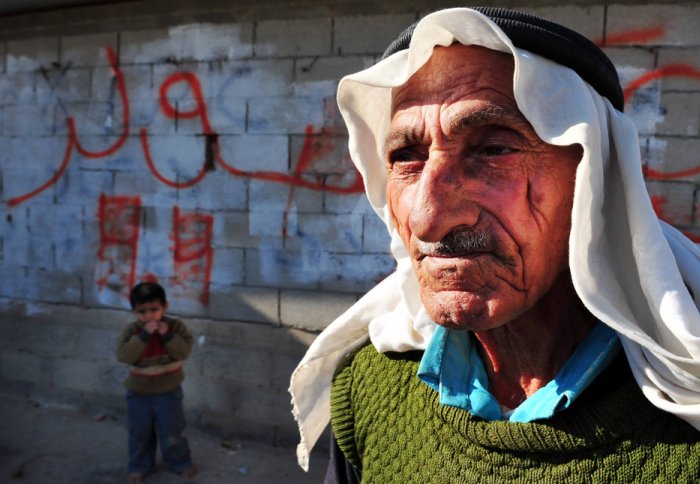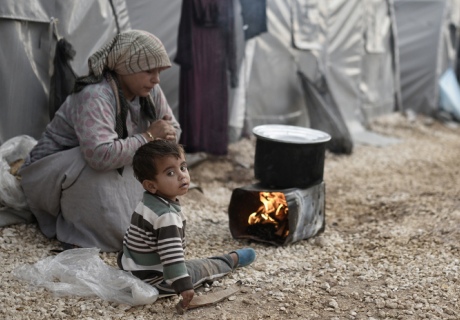Mental illness, suicide and violence creating a 'lost generation' in Middle East
by Ryan O'Hare

Violence and health inequalities are creating a 'lost generation' in the Eastern Mediterranean. Pictured is a Bedouin man and boy in Israel.
Suicide, murder, and sexual assault are increasing faster in the Eastern Mediterranean than any other region in the world, according to a new study.
These violent acts, as well as conflicts, accounted for more than 200,000 deaths in 2015 in the region.
The study region, defined as the ‘Eastern Mediterranean’ by the World Health Organization, is home to more than 600 million people across 22 countries, including Syria, Lebanon, Egypt, Palestine, Israel and Afghanistan.
The research, led by the Institute for Health Metrics and Evaluation (IHME) at the University of Washington, found that in addition to violence in the region, there has been a sharp increase in non-communicable diseases and mental health conditions such as depression, anxiety, bipolar disorder, and schizophrenia. Depression and anxiety disorders were the most common mental conditions, according to the study, published today in the International Journal of Public Health. Both affect women more than men.
Professor Azeem Majeed, from Imperial College London and one of the lead advisors on the papers, said: “Key steps to improve the health and well-being of people in the Eastern Mediterranean must include ending the wars and conflicts in the region, as well as improving education and employment opportunities, particularly among women.
“Health systems must be strengthened as well, for example, through building up primary care and using health programmes to target the causes of ill-health, such as high-calorie diets, smoking, physical inactivity and obesity.
“In addition, health workers and government should aim to improve maternal and child health and ensure that immunisation rates are high, as well as addressing environmental factors such as air pollution.”
'Intractable and endemic violence'
Mental disorders contributed to nearly 11 million years lived in less than ideal health, also known as years lived with disability, or YLDs. The problem is exacerbated by the lack of both mental health practitioners and funding for services.
Key steps to improve the health and well-being of people in the Eastern Mediterranean must include ending the wars and conflicts in the region, as well as improving education and employment opportunities, particularly among women
– Professor Azeem Majeed
School of Public Health, Imperial College London
Throughout the region, the ratio of practitioners to 100,000 people was about seven on average and was as low as 0.5 psychiatrists per 100,000 people in countries such as Libya, Sudan, and Yemen. By comparison, among European nations the ratio ranges from nine per 100,000 to more than 40.
“Intractable and endemic violence is creating a lost generation of children and young adults,” said Dr Ali Mokdad, the study’s lead author and the Director for Middle Eastern Initiatives at the IHME. “The future of the Middle East is grim unless we can find a way to bring stability to the region.”
“With globalization and urbanization of most societies, women may be exposed to numerous stressors, which have repercussions on the entire household, and children in particular,” said Dr Raghid Charara, of American University of Beirut and one of the study’s more than 500 collaborators.
In 2015, nearly 30,000 people in the region died by suicide and another 35,000 died from interpersonal violence, representing increases of 100% and 152%, respectively, over the past 25 years. In other parts of the world during the same period, the number of deaths from suicide increased 19% and interpersonal violence by 12%.

Ending conflicts in the region is key to improving health and wellbeing. Pictured is a Syrian mother and child living in a refugee camp
The study found that hanging and poisoning are the most common methods of suicide in the Eastern Mediterranean Region. The authors note that statistics on suicide are likely to be underestimated due to cultural and religious barriers, social stigma and legal punishments that discourage victims, families, and governments from disclosing such information.
Soaring levels of heart disease
The 15 papers and three editorials that constitute the study are based on the most recent estimates from the annual Global Burden of Diseases, Injuries, and Risk Factors study (GBD), a systematic, scientific effort to quantify the magnitude of health loss from all major diseases, injuries, and risk factors by age, sex, and population. With more than 2,300 collaborators in 132 countries and 3 non-sovereign locations, GBD examines 300-plus diseases and injuries.
This study clearly indicates that the future health of the region is in danger
– Dr Ali Mokdad
Director for Middle Eastern Initiatives at the IHME
Highlights of the report include identifying heart disease as a leading cause of death in the region followed by cerebrovascular disease. While total deaths from diarrheal diseases have fallen by 65%, diabetes and tracheal, bronchus, and lung cancer have increased by nearly 140%.
Poor diet is the leading cause of disability-adjusted life years (DALYs) in the region. People in many countries are suffering from malnutrition and at the same time from poor diet that is leading to disease. In addition, tobacco smoking and high blood pressure are among the top causes of DALYs.
“In recent years, many of the health gains for some countries have slowed and several health conditions that were under control are re-emerging,” said Dr Mokdad. “This study clearly indicates that the future health of the region is in danger.”
The Eastern Mediterranean Region represents a diverse group of 22 countries: Afghanistan, Arab Republic of Egypt, Bahrain, Djibouti, Iraq, Islamic Republic of Iran, Jordan, Kingdom of Saudi Arabia (KSA), Kuwait, Lebanon, Libya, Morocco, Oman, Pakistan, Palestine, Qatar, Republic of Yemen, Somalia, Sudan, Syrian Arab Republic (Syria), Tunisia, and the United Arab Emirates (UAE).
The complete set of papers and data visualizations are available at www.healthdata.org
This article is adapted from materials provided by the University of Washington.
Article text (excluding photos or graphics) © Imperial College London.
Photos and graphics subject to third party copyright used with permission or © Imperial College London.
Reporter
Ryan O'Hare
Communications Division